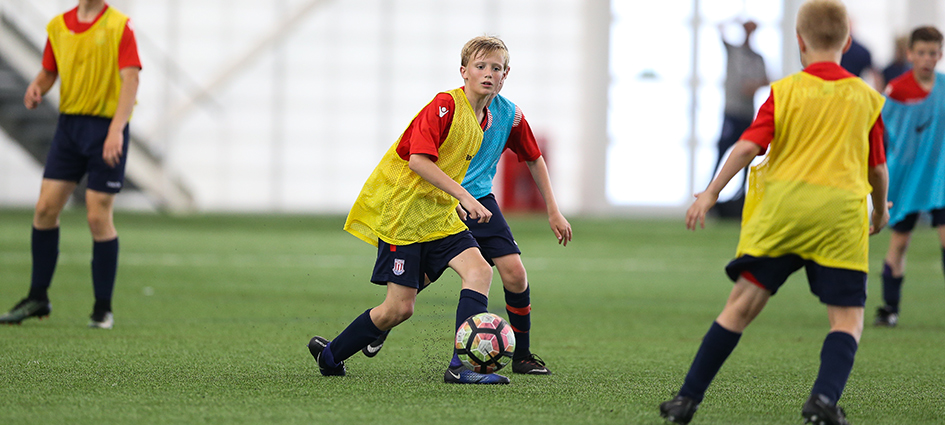
How to develop technical players in the Youth Development Phase
- The Boot Room
- 27 May 2020
Developing players technically and tactically is vital when coaching in the Youth Development Phase. As the youngsters grow and develop as people, hopefully they'll grow and develop as players too.
It's important that coaches focus on creating the right environment and provide positive experiences through both training and matches, so players can learn and explore their changing capabilities both technically and tactically.
What we value and say "well done" for, will go some way to shaping how the youngsters play and think in the game. If the player who kicks the ball off the pitch when they could have turned gets the biggest 'well done', then we're unlikely to develop creative and intelligent players.
If every player's always restricted to a maximum of two touches, we won't develop many players who can dribble or travel with the ball. If we only shout "not-in-there" to the midfielder trying to receive passes from defenders, then we won't develop many midfielders comfortable with receiving the ball under pressure. If we restrict players to only playing the way they're facing, we won't develop many players who can turn well with the ball.
The best players have a variety of possibilities available to them in order to make the best decisions – a safe pass might sometimes be the best option, but we need to develop players who have the skills and creativity to maximise the opportunities presented to them.
Players should be set free to explore and stretch their boundaries and capabilities
Developing players technically is vitally important throughout the Youth Development Phase and beyond. Coaches need to strive to help players explore and refine their individual skills, in and out of possession and help them develop a variety of techniques, which can be used creatively and intelligently in game situations. Players should be set free to explore and stretch their own boundaries and capabilities, using their imagination to explore a range of possibilities.
Every player is unique and will have their own individual skill set, so it would be wrong to assume that all players must fit a predetermined mould and it's unlikely that everyone will be good at everything. With this in mind, we must work from where each individual is currently at in their development, whilst bearing the future in mind of where their journey and potential might take them.
FA national coach developer Paul McGuinness and FA Youth Development Phase DNA lead Graeme Carrick discuss:
The tactical development of our players is also important. In the Youth Development Phase, this is as much about individual tactics as team tactics. Decision-making is crucial – both on an individual and team level – and it’s vital that we don’t skip stages in the players’ development by becoming too team-orientated too soon.
When executing technically in a game, it's always in relation to the 'picture' and situation a player is in. Coaches need to help players understand how and when to stay on the ball; how and when to connect and combine with others; how and when to create and use space for themselves as well as for others – creatively and intelligently. Players also need to learn to defend enthusiastically and intelligently in a variety of situations.
Take a look at the England DNA age-phase priorities statements below:

In the end, the best players are those able to skilfully adapt to the game situations they find themselves in and come up with the best solutions to the problems faced. At the appropriate time and in an appropriate way, players may begin to understand tactics in relation to style of play and team strategy, and in turn, explore their roles and responsibilities.
Ultimately the team tactics will be determined by the capabilities of the individuals, and how individuals collectively interact as teammates.
We must always prioritise players' love of the ball and love of the game. By creating a positive environment and encouraging players to play with freedom – with a varied diet of well-crafted play, practice and competition activities – you’ll provide the players with a great opportunity to learn and to develop as individuals within the team.
To find out more, explore our Youth Development Phase DNA playlist.


